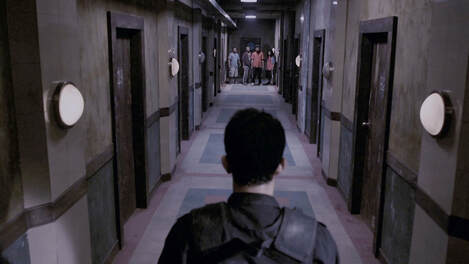|
In Jonathan Glaser’s The Zone of Interest, a father and son, depicted as earnest and industrious factory owners who take pride in their work, make a big sale to a major prospective client. The actors portraying them do an excellent job of feeling excited but downplaying it, as though the characters are too decent to be good at hiding their emotions well. This scene could be the climax of an underdog story, where the elderly father’s dream of building something that will guarantee his legacy and the success of his descendants is finally achieved. Instead, it’s one horrifying entry of many, as the company is selling incinerators to Nazi death camps, each efficiently designed to function around the clock. Glazer’s film focuses on the client, Commandant Rudolf Hess (Christian Friedel), his wife Hedwig (Sandra Huller), and their five children who live in a homestead directly abutting the walls of Auschwitz. Like the factory owners, they’re carrying out their own stories while hundreds of thousands are being snuffed out a few hundred meters away. Glazer uses all his considerable cinematic talents to observe and contextualize this family, never letting them forget how it is they’ve come to live the good life and watching as they shrug.
0 Comments
Two of cinema’s greatest directors sensed the end in 2023. In Killers of the Flower Moon, Martin Scorsese continued his reorientation to the violent men that have characterized much of his career, portraying them as brutes with none of the charisma of his earlier work while casting himself in the role of a radio show narrator humiliated by the dismissive way that film’s tale of rancid monstrosity is being passed along to the audience. He proceeded to give poignant interviews about his looming death, lamenting that there’ll only be a few more chances to do this thing that he loves so much. That kind of ruefulness isn’t in Killers of the Flower Moon, but it’s all over The Boy and the Heron, the latest and likely final masterpiece from Hayao Miyazaki, another all-timer director who’s long questioned the impact and value of his own work. It’s a valedictory film that recapitulates the themes of Miyazaki’s legendary career while openly contemplating the world he brought his work into and the world he’ll leave behind. One Miyazaki movie was always going to be the final one. If The Boy and the Heron is that one, what an incredible note to go out on.
Still smarting from 2023’s major disappointment, Ridley Scott’s Napoleon, Maestro suffers from the same fatal flaw that doomed Scott’s latest historical epic. A movie about a famous male figure doesn’t want to submit to the out-of-fashion great man of history framing, so he shares the cinematic spotlight with his wife. While this gives actresses equal opportunity for prestige filmmaking, it’s the rare biopic or docudrama that makes a marriage as interesting as whatever the central figure accomplished, accomplishments which are the reason the movie is being made in the first place. I knew a lot about Napoleon going into that movie, but all I really knew about Leonard Bernstein is that he inspired Lydia Tar to take up conducting. Bradley Cooper’s thirsty Oscar play leaves this viewer without much to add to that biography, except that he was sweaty, semi-closeted, and sparred with his wife who was also in the public eye. Seems like music would be an important part of the whole picture.
Lanthimos continues his decade-plus long streak of entertaining provocations with Poor Things. The Greek director Yorgos has never been softer or more optimistic than he is here. That turn towards happy endings and pure comedy is not a loss of edge but the evolving ability to apply his style of filmmaking towards something bouncier and satirical. By far the most accessible of his films, Poor Things nonetheless looks and sounds like few others. Based on the film’s critical and commercial success, Lanthimos cements his status as one of the most important and inventive directors in modern cinema.
 One of the joys of foreign cinema is the compare and contrast game. While all movies share similarities within genres, the choreography in a genre like action movies differs from region to region. In Asia, Japan has its period samurai films while Hong Kong combines the mythic wuxia style with Jackie Chan’s life-endangering stunt work. Lacking the decades-long tradition of those two regions, Thailand burst onto screens in the 2000’s with the athleticism of Tony Jaa, and Indonesia followed with the bone-crunching pencak silat style, shepherded to global audiences by Welsh director Gareth Edwards. Edwards became fascinated with Indonesia through his Japanese-Indonesian wife, and found talented non-actors to star in his second film, Merantau. In his follow-up, The Raid: Redemption, Edwards makes a brutal crowd-pleaser of brilliant physicality and contained simplicity, and puts an Indonesian style of martial arts on the map. |
AuthorsJUST SOME IDIOTS GIVING SURPRISINGLY AVERAGE MOVIE REVIEWS. Categories
All
Archives
April 2023
Click to set custom HTML
|




 RSS Feed
RSS Feed